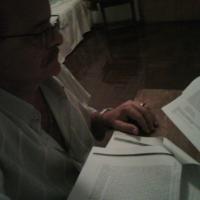Out of curiosity...why not Ido?
من Aubright, 1 يناير، 2013
المشاركات: 56
لغة: English
sudanglo (عرض الملف الشخصي) 4 يناير، 2013 9:38:59 م
Machine translation is already surprising good now, and will only get better in the future.
To affect people's attitudes to the concept of an constructed IAL as a solution to the language problem, the automatic translations don't have to be perfect, just good enough.
When it comes about that you just have to download the appropriate app into your smart phone, in order to have a conversation with someone who doesn't speak your language, then people won't see the point of spending six months learning Esperanto (or for that matter any other language, natural or artificial).
Vilius (عرض الملف الشخصي) 4 يناير، 2013 9:49:01 م
Paulinho (عرض الملف الشخصي) 4 يناير، 2013 10:37:21 م
erinja (عرض الملف الشخصي) 5 يناير، 2013 11:36:05 م
Vestitor (عرض الملف الشخصي) 6 يناير، 2013 2:25:08 ص
erinja:Whoever would like to discuss machine translation should probably start a new thread to do it.I'd lime to, so it's here.
Paullen (عرض الملف الشخصي) 3 يناير، 2015 7:54:09 م
Christa627 (عرض الملف الشخصي) 3 يناير، 2015 9:17:25 م
Paullen:English is a severe mass of confusion to be trying to inflict upon the worlds. I find it a very difficult language to learn, and this is coming from American English native speaker.I totally agree! I remember as a kid lying awake at night thinking about all the bothersome irregularities in English; how if we have mouse/mice and louse/lice, then we really ought to have house/hice, and douse/dice! Or better yet, just say mouses and louses and dies. And there were other things of this nature; irregular verbs and nouns and stuff. That is why, when I read that Esperanto doesn't have those things, I didn't care about who speaks it or what they use it for. I just felt like I'd found what I was looking for all my life, and started learning it as fast as I could!
I also agree with Erin's assessment of Ido as silly-looking; I some time back out of curiosity went to the Ido Wikipedia, to see what the language looks like, and thought that it looked like an odd mixture of languages. I think the main culprit for that was the -ar ending for infinitives; it just looks so Spanish to me. There were some other things I identified as contributing to that impression, but I don't remember what they were now. I also went to the Interlingua Wikipedia, and had a similar impression. I could understand quite a bit of the content, but found it somewhat tiring (of course, as it is a different language, after all!).
But when I went to a Volapük website, I had a different impression. I couldn't understand it at all, but I though it had a more coherent appearance. It looked like something that might be a "natural" language. Maybe it was just because it was less familiar; a person who speaks only Chinese or some other language that has very little lexical similarity to European languages might have the same impression of Ido or Interlingua as I had of Volapük. I couldn't say.
All I can say is that in my humble opinion, Esperanto's aesthetics are better than those of Ido or Interlingua; I think it looks more natural and coherent.
Nephihaha (عرض الملف الشخصي) 4 يناير، 2015 1:40:40 ص
Nephihaha (عرض الملف الشخصي) 4 يناير، 2015 2:09:08 ص
Oijos:You are seriously out-of-date. The language that will dethrone Esperanto is not eurocentric.European grammar aside, Eurocentrism is not a crime here. European vocabulary is used on EVERY continent incl Asia and Antarctica. Even in East Asia, cities such as Vladivostok and Singapore use European languages.
It will be so called worldlang.
worldlang
sudanglo (عرض الملف الشخصي) 4 يناير، 2015 2:21:48 م
Imagine a language where every object has to have a sex. Any armchair theorist would be bound to say that such language as no chance. Yet somehow French has survived, was even for a time the lingua franca.
The Idists went charging off down a blind alley, didn't understand the nature of language. The point was that Esperanto's formal features were already adequate and the language already simple to learn by a substantial enough factor compared to the natural languages.
The competitive threats faced by Esperanto are not other conlangs. They are 1. English (no of speakers) and 2. machine translation (convenience). And of those two I would rate machine translation as perhaps the most threatening.
Incidentally, just recently on Radio 4 there was a demonstration of real-time machine translation of a conversation, with one party speaking in English, then translated to Spanish, and the other party's replies in Spanish, then translated to English.
Esperanto's big problem is number of speakers, not formal features. And to persuade large numbers of people to learn it, faced with the convenience and ever-growing sophistication of machine solutions to the language problem is going to require the Esperantists to sharpen their arguments to address that threat head on.






